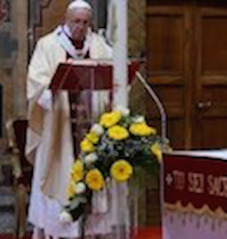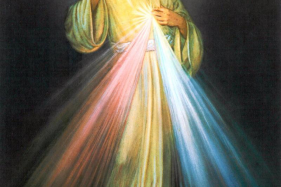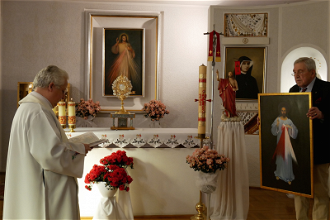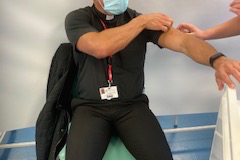On Divine Mercy Sunday Pope warns: 'indifference is worse than pandemic' + text

Source: Vatican News
Pope Francis celebrated Mass on Divine Mercy Sunday, in the Church of the Holy Spirit in Saxony near St Peter's Square, without a congregation - because of the Covid-19 lockdown. In his homily he invited us to accept Jesus's mercy as the Apostle Thomas did, and to show that mercy to those around us.
"Last Sunday we celebrated the Lord's resurrection. Today we witness the resurrection of his disciple" the Pope began. One week after Jesus rises from the dead, the disciples are still "fearful, hiding behind locked doors." Jesus' response to their fear is "Peace be with you!"
Jesus "starts all over," Pope Francis explained. The "resurrection of his disciple begins" with "faithful, patient mercy." In this way, we learn that God does not get tired of lifting us up when we fall. God is like a father who allows us to take tentative steps and picks us up every time we fall.
"The hand that always puts us back on our feet is mercy." God knows we will continue to fall. But He will always pick us up because He wants us to look to Him rather than at our failings, the Pope said.
All of the disciples had abandoned Jesus. They all felt guilty. Rather than giving them a long sermon, the Pope said, Jesus shows them His wounds.
Once Thomas, who had not been there the first time, touches those wounds, "he overtook the other disciples. He believed not only in the resurrection," but in God's boundless love as well. When Thomas's "wounded humanity enters into" Jesus's wounds, he rises from the dead, Pope Francis said.
"Thomas helps us understand how precious we are to the Lord in our vulnerability, like beautiful, fragile, but precious crystals. If we are like that crystal, Jesus's "light of mercy will shine in us and through us in the world."
This light will help us wait for other people, as Jesus waited for Thomas, so no one is left behind as the entire world recovers from the Covid-19 crisis.
"Selfish indifference is a worse crisis than the pandemic, the Pope warned. It is "spread by the thought that life is better if it is better for me."
The first Christian community had received mercy and lived with mercy, he explained. They pooled all their resources together, and distributed it to those in need.
"This is not some ideology.. .It is Christianity".
Pope Francis concluded his homily urging us to welcome the current crisis as an "opportunity to prepare for our collective future."
The recovery effort needs to embrace everyone, he said. Otherwise, "there will be no future for anyone." The "simple and disarming love of Jesus" revived Thomas's heart.
May we too accept Jesus's mercy and show that mercy to the most vulnerable, Pope Francis said. That is what saves and builds the world.
After Mass, before the Regina Caeli prayer, Francis Pope Francis said mercy is not simply "devotionalism, or mere assistance, but com-passion, which comes from the heart."
He said: "Divine Mercy comes from the Heart of the Risen Christ. It flows from the wound in His side that is always open, open for us, who are always in need of pardon and comfort."
As the world faces the Covid-19 pandemic, he prayed that nations might find inspiration in Christian mercy to help their citizens in "the spirit of solidarity."
Pope Francis sent his greetings to "our brothers and sisters in the Orthodox Churches and Eastern Catholic communities who celebrated Easter Sunday on 19 April this year."
"At this moment of trial," he said, "let us feel what a great gift and hope it is that comes from being risen with Christ!"
Watch the Mass and Regina Coeli here: www.youtube.com/watch?v=xr2JSxBsPaE
Read the official translation the Pope's Homily at the Mass on Divine Mercy Sunday, April 19, 2020:
Last Sunday we celebrated the Lord's resurrection; today we witness the resurrection of his disciple. It has already been a week, a week since the disciples had seen the Risen Lord, but in spite of this, they remained fearful, cringing behind "closed doors" (Jn 20:26), unable even to convince Thomas, the only one absent, of the resurrection. What does Jesus do in the face of this timorous lack of belief? He returns and, standing in the same place, "in the midst" of the disciples, he repeats his greeting: "Peace be with you!" (Jn 20:19, 26). He starts all over. The resurrection of his disciple begins here, from this faithful and patient mercy, from the discovery that God never tires of reaching out to lift us up when we fall. He wants us to see him, not as a taskmaster with whom we have to settle accounts, but as our Father who always raises us up. In life we go forward tentatively, uncertainly, like a toddler who takes a few steps and falls; a few steps more and falls again, yet each time his father puts him back on his feet. The hand that always puts us back on our feet is mercy: God knows that without mercy we will remain on the ground, that in order to keep walking, we need to be put back on our feet.
You may object: "But I keep falling!". The Lord knows this and he is always ready to raise you up. He does not want us to keep thinking about our failings; rather, he wants us to look to him. For when we fall, he sees children needing to be put back on their feet; in our failings he sees children in need of his merciful love. Today, in this church that has become a shrine of mercy in Rome, and on this Sunday that Saint John Paul II dedicated to Divine Mercy twenty years ago, we confidently welcome this message. Jesus said to Saint Faustina: "I am love and mercy itself; there is no human misery that could measure up to my mercy" (Diary, 14 September 1937). At one time, the Saint, with satisfaction, told Jesus that she had offered him all of her life and all that she had. But Jesus' answer stunned her: "You have not offered me the thing is truly yours". What had that holy nun kept for herself? Jesus said to her with kindness: "My daughter, give me your failings" (10 October 1937). We too can ask ourselves: "Have I given my failings to the Lord? Have I let him see me fall so that he can raise me up?" Or is there something I still keep inside me? A sin, a regret from the past, a wound that I have inside, a grudge against someone, an idea about a particular person… The Lord waits for us to offer him our failings so that he can help us experience his mercy.
Let us go back to the disciples. They had abandoned the Lord at his Passion and felt guilty. But meeting them, Jesus did not give a long sermon. To them, who were wounded within, he shows his own wounds. Thomas can now touch them and know of Jesus' love and how much Jesus had suffered for him, even though he had abandoned him. In those wounds, he touches with his hands God's tender closeness. Thomas arrived late, but once he received mercy, he overtook the other disciples: he believed not only in the resurrection, but in the boundless love of God. And he makes the most simple and beautiful profession of faith: "My Lord and my God!" (v. 28). Here is the resurrection of the disciple: it is accomplished when his frail and wounded humanity enters into that of Jesus. There, every doubt is resolved; there, God becomes my God; there, we begin to accept ourselves and to love life as it is.
Dear brothers and sisters, in the time of trial that we are presently undergoing, we too, like Thomas, with our fears and our doubts, have experienced our frailty. We need the Lord, who sees beyond that frailty an irrepressible beauty. With him we rediscover how precious we are even in our vulnerability. We discover that we are like beautiful crystals, fragile and at the same time precious. And if, like crystal, we are transparent before him, his light - the light of mercy - will shine in us and through us in the world. As the Letter of Peter said, this is a reason for being "filled with joy, though now for a little while you may have to suffer various trials" (1 Pt 1:6).
On this feast of Divine Mercy, the most beautiful message comes from Thomas, the disciple who arrived late; he was the only one missing. But the Lord waited for Thomas. Mercy does not abandon those who stay behind. Now, while we are looking forward to a slow and arduous recovery from the pandemic, there is a danger that we will forget those who are left behind. The risk is that we may then be struck by an even worse virus, that of selfish indifference. A virus spread by the thought that life is better if it is better for me, and that everything will be fine if it is fine for me. It begins there and ends up selecting one person over another, discarding the poor, and sacrificing those left behind on the altar of progress. The present pandemic, however, reminds us that there are no differences or borders between those who suffer. We are all frail, all equal, all precious. May we be profoundly shaken by what is happening all around us: the time has come to eliminate inequalities, to heal the injustice that is undermining the health of the entire human family! Let us learn from the early Christian community described in the Acts of the Apostles. It received mercy and lived with mercy: "All who believed were together and had all things in common; and they sold their possessions and goods and distributed them to all, as any had need" (Acts 2:44-45). This is not some ideology: it is Christianity.
In that community, after the resurrection of Jesus, only one was left behind and the others waited for him. Today the opposite seems to be the case: a small part of the human family has moved ahead, while the majority has remained behind. Each of us could say: "These are complex problems, it is not my job to take care of the needy, others have to be concerned with it!". Saint Faustina, after meeting Jesus, wrote: "In a soul that is suffering we should see Jesus on the cross, not a parasite and a burden… [Lord] you give us the chance to practise deeds of mercy, and we practise making judgements" (Diary, 6 September 1937). Yet she herself complained one day to Jesus that, in being merciful, one is thought to be naive. She said, "Lord, they often abuse my goodness". And Jesus replied: "Never mind, don't let it bother you, just be merciful to everyone always" (24 December 1937). To everyone: let us not think only of our interests, our vested interests. Let us welcome this time of trial as an opportunity to prepare for our collective future. Because without an all-embracing vision, there will be no future for anyone.
Today the simple and disarming love of Jesus revives the heart of his disciple. Like the apostle Thomas, let us accept mercy, the salvation of the world. And let us show mercy to those who are most vulnerable; for only in this way will we build a new world.
© Libreria Editrice Vatican


















